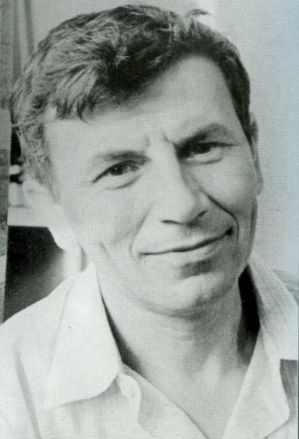A Sixtier, participant in the dissident movement, a political prisoner.
Nedobora was born into a family of convinced communists; his father was the director of a rabfak (workers' faculty), and his mother was a teacher.
At the beginning of WWII, his father refused a deferment and went to the front, where he soon died. His mother with two children—Vladyslav and his younger brother Oleh—was evacuated to Chelyabinsk. They returned to Kharkiv after its liberation in 1943.
In 1951, Nedobora graduated from secondary school with a silver medal. After receiving a higher education at the Kharkiv Polytechnic Institute, Nedobora worked as a design engineer until 1970.
In 1963, Nedobora married S. Karasik. On June 11, 1964, his son Hryhoriy was born.
His political biography began in high school. He was an active Komsomol member, the Komsorg of his class, and very principled. But gradually, the incompatibility of theory and ideology with reality prompted Nedobora and his friends to reflect and seek information outside official sources. First of all, they listened to foreign radio.
N. Khrushchev's report at the 20th Congress in 1956 initially caused shock. But internally, Nedobora was already prepared for such information.
His first encounters with the KGB took place in the summer of 1967, after H. O. ALTUNYAN met General P. H. GRYGORENKO and P. I. Yakir in Moscow. They knew these names from foreign radio broadcasts. Petro Yakir connected the Kharkiv residents (V. H. Nedobora, H. O. ALTUNYAN, A. Z. LEVIN, S. K. Podolsky, O. S. Kalinovsky) with V. V. PONOMARYOV, from whom they began to receive “samvydav.” When, at the beginning of 1969, H. ALTUNYAN and A. LEVIN in Moscow, together with P. Yakir and other dissidents, were drafting a letter in defense of the recently arrested P. GRYGORENKO in Tashkent, Nedobora, along with V. PONOMARYOV, collected signatures for this letter. They then signed a letter to the UN Human Rights Committee regarding violations of human rights in the USSR.
In July 1969, H. ALTUNYAN was arrested, and his trial took place in November. On the last day of this trial, Nedobora was arrested, held for 3 days at the KGB, and released on November 30, 1969. Then, for 2 months, Nedobora was summoned for interrogations at the prosecutor's office almost every day, and each time his wife, 7 months pregnant with their second child, accompanied him. His wife did not know if Nedobora would return from the interrogation, as V. Ponomaryov had been arrested in just this way in December 1969.
Nedobora was arrested on February 3, 1970. The cases of Nedobora and V. PONOMARYOV were combined into one, and on March 10–11, 1970, the Kharkiv Oblast Court (judge—Chernukhin, prosecutor—Lebedev, lawyer—Monakhov) sentenced each of them under Article 187-1 to 3 years of imprisonment in general-regime camps.
Nedobora's final statement at the trial impressed even the carefully selected audience in the courtroom (others were not allowed in). Nedobora quoted the words of the great Russian philosopher Chaadaev:
“I have not learned to love my Fatherland with my eyes closed, my head bowed, my lips sealed. I find that a man can be useful to his country only if he sees it clearly; I think that the time of blind infatuations has passed... I believe that we came after others in order to do better than them, not to fall into their mistakes, their delusions, and their superstitions.”
On May 3, 1970, Nedobora's second son, Mykhailo, was born.
Nedobora served his sentence in a camp in Zhovti Vody, Dnipropetrovsk Oblast.
After his release, he was not hired for an engineering position anywhere, clearly not without the influence of the KGB, so he had to work as a loader and a rigger.
Nedobora's wife could not be fired from her job immediately because she was pregnant. In 1980, she resigned herself, because her 16-year-old eldest son was accepted into the music school at the Moscow Conservatory, and his mother went with him to Moscow. When she returned a year later, she too was not hired for a position in her field anywhere and also worked as a loader, cleaner, and orderly.
After serving his sentence, Nedobora, together with H. ALTUNYAN, helped those who were persecuted by the authorities (V. Borovsky, A. ZDOROVYI, Ye. Antsupov, and others). P. GRYGORENKO stayed at his home during his visits to Kharkiv. During the perestroika era, after H. ALTUNYAN was elected as a deputy to the Verkhovna Rada, he worked as his assistant and helped with the work of the Kharkiv Human Rights Protection Group.
Nedobora's sons: Hryhoriy, a violinist, worked in the famous orchestra “Moscow Virtuosi” under the direction of V. Spivakov, has 2 children, and lives in Spain; Mykhailo is a chess player, a chess coach, has 5 children, and lives in Israel.
Nedobora is buried in Israel, where he died after a short but severe illness while visiting his younger son.
Bibliography:
A Chronicle of Current Events, issue 13. 30.04.1970.
KHPG Archive, interviews, records.
Iryna Rapp

NEDOBORA VLADYSLAV HRYHOROVYCH